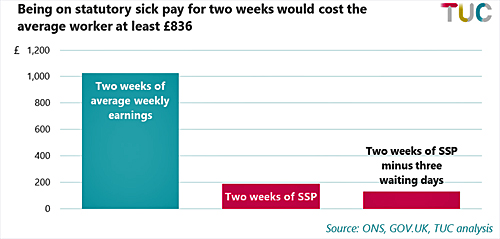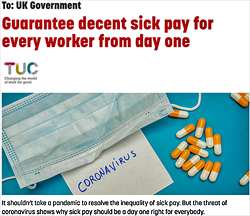 |
|
|
|
The only answer to people working despite being sick, is to legislate against punitive sick policy by HR depts. Arbitrary sickness warnings used to ultimately dismiss worker's and force them to work despite illness!
But not only are we the 'sick man of Europe' we are also the 'lowest paid sick man of Europe'! The UK's statutory sick pay (SSP) pays out only £94.25 per week for up to 28 weeks, and does not kick in until after the 4th day of 'consecutive' illness and absence from work. To qualify, a worker's average weekly earnings over the previous eight weeks must be at least £118 a week. Statutory sick pay and social protections for jobless and self-employed people in the UK breached legal obligations under European law, the Council of Europe has found in 2018. The committee said the conclusions had been drawn due to “inadequate” statutory sick pay, minimum levels of Employment Support Allowance, the level of long-term incapacity benefits, the level of unemployment benefits, and all self-employed and domestic workers not being covered by the occupational health and safety regulations. “Regardless of the additional social assistance benefits which might be available, the committee considers that the level of these benefits is manifestly inadequate,” the committee said. You can download the full report from the EU ( Sick Pay and Sickness Benefit Schemes In The European Union ) which contains the above graphic and stats on the various 28 member states of the EU, including then; the UK in order to understand why the EU committee found the UK's system to be illegal in that it breached the EU legislation that the UK had signed up to. The EU's in depth review of the UK's SSP scheme, how it works and the amount it pays to sick workers, was completed, and a report issued in January of 2018. As with so many things in the UK, the report identified that the UK was second from bottom in terms of EU standards as compared to other EU member states. Only Malta (MT) came in with lower standards and level of pay for sick workers. Of course now that the UK has left the EU, the government can reduce even further these standards and even align with those of the USA, to otherwise be sued under the ISDS arrangements which may be inherent in any trade deal the UK does with the US, on the grounds that to maintain the UK, albeit the lowest in Europe, sick pay legislation; makes for a barrier to trade and unfair competition! The TUC has issued a special report covering sick pay and the current Coronavirus (Covid-19) outbreak in the UK and across the world, in which it highlights the inadequacy of the SSP system relying as it does on a Certification of sickness absence: But the TUC makes further recommendations in 2020, with readers of this website being only too aware that Government reviews into the UK's level of sickness took place in November 2011 ( Dame Carol Black Review) with the Government's response published some two years later in 2013. However, very little changed as a result of her report and today we find that the Government's SSP rules and payment levels are inadequate, not only in the case of the Coronavirus, but also for the country in 'seasonal flu' times, and generally whenever workers are in need of absence from work due to illness, injury in the community as well as injuries caused and workplace accidents. HR department policies do NOT take into account the circumstances of the sick absence and penalise all workers including those in need of urgent hospital treatment and even cancer sufferers!
The TUC report also makes a number of recommendations and calls for the Government to take immediate action in the face of the current threat the Coronavirus poses for the British workforce and the financial circumstances of those needing to be off work as a result of either self-isolation or having caught the virus, and being in treatment which of course always needs a period of hospital quarantine as the clinicians addresses and treat the symptoms caused. TUC research shows that the UK has 3.7 million insecure workers - those who are self-employed, on zero-hours contracts, or do agency, casual or seasonal work. A Summary of the report's recommendations is below: Government should:
Employers should:
As a result of their findings and because of the Coronavirus bringing into sharp focus that the UK's sickness pay legislation is not fit for purpose, the TUC has launched a petition, of which the supporting argument aimed at the UK's government is as follows:
But already companies like Wetherspoons are refusing to give staff sick pay from day one, even if they are quarantined by government order. Right now millions of UK workers don’t earn enough to get this protection. And even those that do have to be off sick for at least three days before they get paid.
And workers with existing sick pay schemes should be paid at the full rate offered by the employer while in isolation, and not be considered as on annual or unpaid leave. You can sign the petition by clicking on the pic above right. For a copy of each of the above reports, go to the Unionsafety E-Library Use search word 'SSPUK' to see a list of relevant documents for you to download. Source: TUC / Business Insider / Unionsafety / EU
|

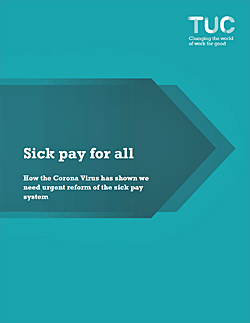 Finally, it is coming into the public arena - the punitive measures used by HR departments to minimise sickness absence levels, and force people to work even though they are ill, even with commutative illnesses such as the common cold and the more deadly Influenza bug.
Finally, it is coming into the public arena - the punitive measures used by HR departments to minimise sickness absence levels, and force people to work even though they are ill, even with commutative illnesses such as the common cold and the more deadly Influenza bug. 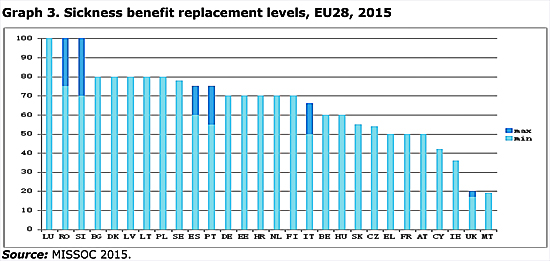
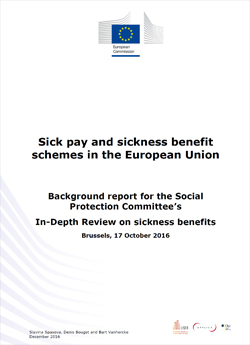 Click on the pic right, or go to the Unionsafety E-Library to download other documents concerning the UK's statutory sickness pay (SSP) legislation. Search word 'SSPUK' will find the relevant documents for you to download.
Click on the pic right, or go to the Unionsafety E-Library to download other documents concerning the UK's statutory sickness pay (SSP) legislation. Search word 'SSPUK' will find the relevant documents for you to download. 